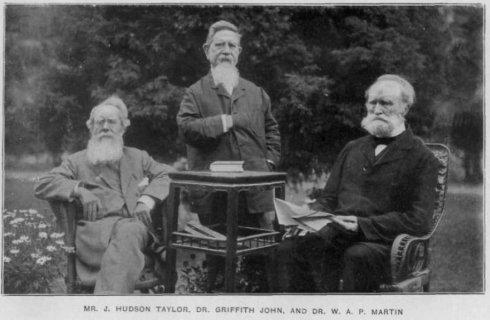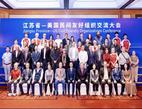Griffith John, came to China sent by the London Missionary Society and was the first protestant to preach the gospel in central China. He was the founder of the churches in central China and known as the "Father of Missionaries to Central China".
On December 14, 1831, Griffith John was born into an ordinary working-class family in Swansea, Wales, UK. His whole family were congregational believers and Griffith John was the Griffith Johnest and the only boy. Just eight months after Griffith came into the world, a cholera outbreak took his mother's life. It was his aunt who took up the job of bringing him up. Because of the strong spiritual atmosphere in his family, his passion and enthusiasm in his faith was well nurtured.
The poverty of his family forced Griffith to drop out of school and he went to work at a grocery store as a child worker at the age of 12. However, he loved learning and tried his best to use his spare time to find books to read. Through great diligence, he accumulated a wide range of knowledge, even more than many of his school peers. At the age of 16 he was already in charge of giving sermons in a local church. In 1850, Griffith John was admitted to Brecon University and three years later went on to study at Bedford Theological Seminary. Due to his excellent grades and the urgent need for overseas missionaries in the London Missionary Society, in 1855, the Mission agency allowed Griffith to graduate early and ordained him as a reverend to be sent to China to preach. The then Griffith John was not tall and as a result many people called him "the kid". Some even jokingly called him "the kid to lead China to return to Christ."
In September 1855, Griffith John arrived in Shanghai with his wife. He began preaching in the areas around Shanghai. In 1857, he went with Joseph to the Taiping Kingdom of Heaven occupied regions to do research. In 1860, Griffith met with the Gan King, Hong Renxuan, and the Zhong King, Wang Li Xiucheng. Although Griffith John tried to correct the doctrinal mistakes of this Taiping Christianity, he encountered rejection from Hong Xiuquan (head of the cult) and others. Nevertheless, he still managed to obtain the right to freely do his missionary work in the occupied regions of the Taiping Kingdom of Heaven.
In 1861, Griffith took advantage of the Qing Government's open policy for foreigners to reach inland. On June 21, he arrived in Hankou, becoming the first Protestant missionary to enter central China. Griffith John's evangelical ministry went smoothly, and on March 16, 1862, followers were baptized. From that time onward, many people were led to faith in the name of the Lord. Several churches were built.
In 1862, Griffith John built the Hualou mother Church in Hankou (the famous Griffith Church, or Rongguang Church). In 1863 he built Shouen Church in Hankou, the first church in central China. In July 1864, the first church in Hubei Province, Chongzhen Church, was built in Wuchang City. After Wuhan was well established and gained a strong foothold, Griffith John expanded his ministry to other parts of Hubei by founding churches in Xiaogan, Tianmenzhao City and Huangpo.
Griffith John preached in a style combining street preaching and traveling as a itinerant preacher while he went around China. He distributed many gospel pamphlets in addition to oral evangelism at each place. He sometimes travelled more than 3000 miles leaving "footprints" throughout Hubei, Hunan, Sichuan and other places. In each place local churches were established. According to studies on his ministry, during the period of time of Griffith John's contribution in China, Hubei alone had at least 100 mission stations.
In 1889, Griffith John was elected president of the National Association of the Congregationalist Church of England and Wales, but he refused to return to take the prominent position and decided to stay in Hankou to live with his beloved Chinese. In the same year, the University of Edinburgh awarded him a doctoral degree in theology in recognition of his missionary work in China.
Griffith John participated in the ministry of Bible translation. He was the first translator to translate the English New Testament into Moderate-Classical Chinese (a type of written style between Classical Chinese and Vernacular Chinese) also known as Easy Wenli. He published the Chinese translation of the Gospels of Mark and Matthew in 1883, the whole New Testament translation in 1885, Genesis and Exodus in 1889, Psalms and Proverbs in 1898, and the entire Old Testament in 1905. Moreover, Griffith John published books such as "Expectations for China" and "The Voice of China".
In addition, Griffith John highly valued the work of science, education, arts and health. In 1866, he founded Renji Hospital in Hankou (the predecessor of Hankou Union Hospital), one of the earliest Western hospitals in central China. In 1899 (also thought to be 1896), Griffith John, on the old site of a tea box factory next to the Hualou mother Church, opened Hankou's first comprehensive institution composed of a college, middle school, teacher training facility, and Bible study department-known as Griffith John College, which is now Wuhan Fourth Middle School. He also vehemently opposed the British opium trade, campaigned for the physical and mental health of the Chinese, and in 1882 wrote, "A Brief Question and Answer on the Opium Trade", which attacked the evils of the opium trade.
In 1905, at the age of 75, Griffith had a sudden stroke while giving a sermon and became paralysed from then on. In October 1911, the Wuchang Uprising broke out. For security reasons, his son-in-law Shi Boheng escorted him to a vessel departing Hankou and returned to England in January 1912. Shortly after returning home, Griffith John died at the age of 81.
- Translated by Charlie Li











